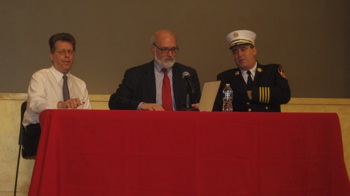
At a public hearing held by the Fire Department this morning, every person who testified spoke against charging a fee for FDNY response to traffic crashes, calling it inappropriate to make drivers pay for what they said ought to be a basic government function.
The charges are part of the Bloomberg administration's attempt to close a budget deficit. The Fire Department proposes to recover the cost of responding to a traffic crash by charging the motorists involved between $365 and $490, depending on the severity of the crash. They estimate the fees would raise $1 million a year.
The charges can also be seen as an attempt to make motorists bear some of the enormous cost of traffic crashes. According to the city Department of Transportation, traffic crashes cost $4.29 billion a year.
No one at this morning's hearing saw it that way. Opposition focused on whether it was right to switch from using general taxation to fund fire services to a user fee model:
- The charge would "radically alter the relationship between the city's taxpayers and the services they receive," said City Council Member Dan Garodnick in a statement read by an aide. Continuing down this path, he argued, would create "two forms of government - one for those who can pay and one for those who cannot."
- "Imposing crash taxes on individuals unfortunate enough to have accidents adds insult to injury," said AAA New York's John Corlett. "Public safety services are a core government function and therefore should be properly budgeted for."
- The flat charges would place "a disproportionate financial burden on poor and minority citizens," said William McDonald of the NAACP's Jamaica Branch, speaking for the branch's president.
Council Speaker Christine Quinn also wrote in to the Fire Department in opposition to the fee. "The Fire Department doesn't charge for its response to structural fires, and the Police Department doesn't charge for patrolling a block. Charging for responding to the scene of an accident is a slippery slope," she wrote. She also worried that drivers might choose not to call 911 if faced with an additional fee, leaving people on the road who shouldn't be, like injured or drunk drivers.
Though the Fire Department has the authority to institute this charge unilaterally, legislation has been introduced in both the City Council and state legislature to take away that power.
One important question that remains unresolved is the extent to which auto insurance policies would cover the charge. Fire Department counsel Julian Bazel seemed to believe that insurance would cover the charge, while multiple insurance industry representatives said that while it depended on the policy, most drivers would be paying out of pocket. State Insurance Superintendent James Wrynn agreed with insurers that most policies wouldn't cover the charge, according to an article in the Daily News.
The charge would work very differently depending on whether the city or the industry is correct. If insurance does cover the charge, the city would essentially be increasing the overall cost of driving, as the fees would show up in all drivers' premiums. If not, it really is a charge for particular services rendered.
Perhaps more importantly, if insurers covered the charge, insurers would in most cases shift all the fees onto the at-fault party in any given crash, according to industry reps. If drivers paid out of pocket, both parties might end up having to pay the charge, even if one was rear-ended while stopped at a red light.





